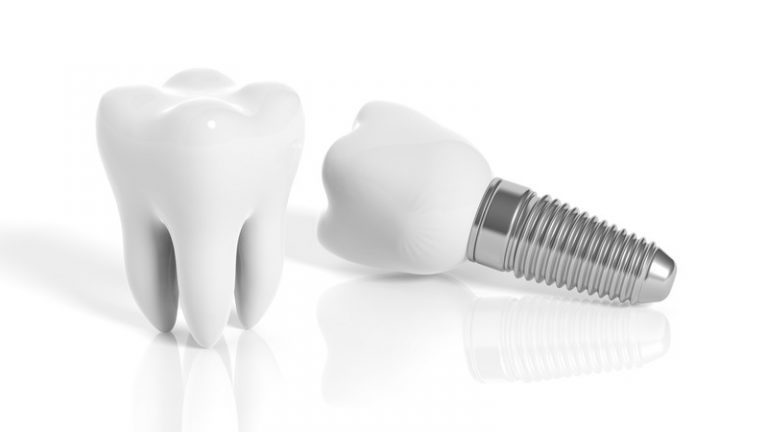It’s well-known that dental implants are the gold standard in comprehensive tooth replacement; they’re the only way to reconstruct a smile holistically, because they don’t just replace a missing crown – they replace the whole tooth – including the root. And this is where the value of the dental implant lies: because it is installed in the jaw, it actually is integrated with the bone over time, anchoring the tooth to the jaw and preserving jaw health at the site.
Here’s the thing, though – what makes dental implants so cool is also what carries risk of failure. Think about it: dentures can’t “fail,” because they’re not a part of your body. Dentures might stop fitting over time, but they can’t be ejected from your body, and they don’t require another surgical procedure to fix. Dental implants, because they really do become a part of your body, when they fail, require repair and replacement. Depending on the damage, they may also require bone and/or soft tissue grafting.
What is Dental Implant Failure & How Common is it?
Before you get too freaked out, dental implant failure isn’t like when an organ transplant gets rejected: there’s no life-threatening tissue necrosis and risk of death. Implant failure instead refers to the post failing to integrate with the bone, and/or the implant breaking. While these events can be uncomfortable and painful, typical dental implant failure is easily remedied by your oral surgeon.
Another reason to breathe easier is that dental implants rarely just fail. Titanium dental implants tend to last for 25-35 years, and depending on who you ask, oral surgeons will tell you there’s a 90-97% success rate through at least 15 years.
However, you don’t have to rely on your odds (even though they’re pretty good). There are steps you can take and pitfalls to avoid in order to make sure your new dental implants keep your smile looking bright for years to come.
Let’s get into the details of why dental implants fail, signs of an issue, and what you can do to prevent implant failure:
Why Do Dental Implants Fail & Can You Tell if it’s Failing?
Dental implant failure is also referred to as peri-implantitis. The most common reason dental implants fail to take is infection at the implant site. Your body is too busy fighting the infection to also try to integrate with the implant post. Infection can be avoided with proper surgical procedure, antibiotics, and thorough aftercare.
Other reasons dental implants may fail to take include:
- Excessive alcohol consumption
- Health conditions like diabetes, cancer and osteoporosis
- Poor oral hygiene
- Teeth grinding/jaw clenching
- Tobacco consumption
- Underlying metal allergy
There are definitely red flags that tell you there’s something awry with your new dental implant. If you experience any of these symptoms after dental implant surgery, consult with your oral surgeon ASAP to minimize any further damage to your mouth:
- Gum recession around the implant
- Gum swelling around the implant
- Noticeable looseness/movement of the implant
- Pain that lasts more than two weeks after the procedure
- Problems chewing and/or speaking
- Problems with your bite alignment
- Swollen face
If your facial swelling is significant and/or you experience fever, nausea or vomiting, let your oral surgeon know what’s going on, but go to urgent care right away nevertheless.
Dental Implants Just Aren’t for Everyone
It’s important to remember that no matter how skilled the oral surgeon and how zealous the patient about their aftercare, dental implants are not a viable option for everybody. Specifically, people with serious medical complications or on certain medications may simply not have the option, because risk of failure would be too high, and even dangerous. People for whom dental implants may not work include:
- Advanced elderly
- Currently taking blood thinners/anti-clotting medications
- Immunocompromised
- Insufficient bone integrity
- Pregnant
- Thyroid disorders
Don’t worry; talk to your oral surgeon. They’ll be able to tailor you just as great of a tooth replacement plan that will be safe for your circumstances.
What Can I Do to Prevent Dental Implant Failure?
So, how do you make sure you’re sitting up at that 97%+ chances of your dental implant properly integrating? Simple! Take good care of your implant(s) and the rest of your mouth, too:
- Brush gently for 2 minutes 2x/day
- Floss gently 1x/day
- Go to regular dental cleanings 2x/year
- Get dental x-rays 1x/year
- Don’t smoke
- Avoid acids and sugars in your diet
- Avoid overly-hard foods in your diet
Basically, just try to live a healthy lifestyle. It won’t just be good for your implants, but your overall health. And the better your overall health is, that’s another extra boost for the health of your dental implants. That way, they’ll last a lifetime – literally.








